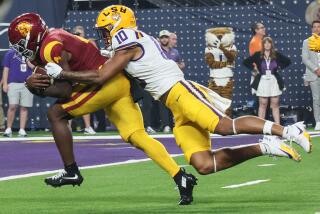NBC Now Playing Games by Masking Its Coverage in Tape
- Share via
If you happened to be watching ESPN’s “SportsCenter” about 4 p.m. Tuesday, you knew the U.S. women won the team gymnastics competition at the Olympics.
If you were watching NBC, you got a quick mention before it broke for local news. If you missed that, you might have assumed you were watching the competition live during prime time Tuesday.
You weren’t.
There are the Olympic Games, and then the games NBC has been playing.
What you see is what you get--but not live.
We’re getting the prime-time block three hours earlier than in the East, but events are being delayed for East Coast viewers too.
An NBC spokesman said 40% of what you’re seeing is on tape. It’s probably even more than that.
A friend who has been getting the Canadian Broadcasting Co.’s coverage off his satellite dish called Tuesday morning.
“NBC is about 10 minutes behind,” he said. “I was watching the U.S.-Angola game [Monday night] on NBC and the second quarter was just about over. On the CBC, the third quarter was just getting under way.”
Another colleague said, “I guess it’s no coincidence that the only swim final NBC delayed [Tuesday night] was the one with no Americans in it.”
NBC claims it has done research--interviewing a sampling of 10,000 viewers--and determined the viewers want to see their features and comments from anchors. And they would rather see something on tape than see an incomplete story.
“We won’t jump around just to prove we can jump around,” Dick Ebersol, NBC Sports president, said before the Olympics.
What NBC is doing is catering to a non-sports-minded audience that doesn’t care about results and credibility. The network is catering to the segment of the audience that wants emotional stories--and lots of gymnastics and swimming.
NBC claims that segment represents the majority.
“We’re giving the viewers what they want, as determined by the 10,000 interviews we did,” NBC spokesman Ed Markey said. “And the ratings prove they like what they’re getting.”
The national rating for Monday night’s competition was a 23.0, the highest for the first Monday of an Olympics since 1984. The Los Angeles rating was an impressive 28.1 with a 48% share of the audience.
OK, the Games are getting good ratings. But NBC needs to start telling its viewers what is live and what is on tape.
That’s what the networks do with golf tournaments. The announcers always tell you when you’re watching tape.
It might not be quite so bad if NBC simply told viewers exactly what is happening.
But the network likes to call it “plausibly live.”
It’s either live, or it isn’t.
NBC isn’t the first network to play games with the Games.
ABC took a lot of heat for not showing the men’s 400-meter relay live at the 1984 Los Angeles Games. Generally, that may not have been a huge thing, but in this case, it was the race in which Carl Lewis won his fourth gold medal.
Another area in which NBC has been lacking is reporting the transportation problems and other snafus in Atlanta, which are dominating the nation’s newspapers.
“In the first three days, we did a feature on security and another on the heat,” Markey said. “We’ll do a story on traffic as it affects an athlete, but the viewers at home don’t want to see those kind of stories.”
So NBC isn’t concerned with the problems in Atlanta. Well, its European counterpart, the European Broadcasting Union, certainly is.
The EBU reportedly has asked for a refund of some of its $250-million rights fee.
An EBU official said, “The working conditions are so bad that members cannot deliver acceptable programs to viewers.”
The official said one page of results was blank, and another claimed the age of a boxer was 95 when it was actually 21.
Things in Atlanta aren’t rosy, even if that’s the picture NBC paints--and much of it on tape.
More to Read
Go beyond the scoreboard
Get the latest on L.A.'s teams in the daily Sports Report newsletter.
You may occasionally receive promotional content from the Los Angeles Times.







